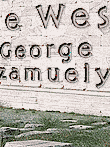Milosevic
was arrested just as the March 31 deadline supposedly stipulated
by Serbia Democratization Act 2000 was expiring. By this
date, according to the legislation, the Administration had
to certify to Congress that the Belgrade regime was sufficiently
in compliance with Washington’s demands that it merited
$50 million in aid. This in fact is yet another lie. The
Serbia Democratization Act does not condition the release
of $50 million on Yugoslavia cooperating with the Hague
Tribunal. It is only the continued imposition of sanctions,
particularly membership in the international financial institutions,
that depended on how Belgrade comported itself towards Carla
del Ponte. Moreover, the March 31 deadline was completely
arbitrary. The legislation makes no mention of this date.
Yet, as usual by dint of repetition, the story of the looming
March 31 deadline became the stuff of high drama. Even so,
Serbian Prime Minister Zoran Djindjic showed his usual shamelessness
by denying that the timing of Milosevic’s arrest had anything
to do with the deadline. "Conditioning of that kind
is unacceptable for a sovereign country," he declared.
Of course it is. No doubt when Djindjic was in Washington
a few days before the arrest US officials must have reassured
him that they would not seek to get their money’s worth
from the bought and paid for Belgrade politicians. Yet two
days after the arrest Djindjic was positively salivating
at the prospect of millions of dollars pouring into Yugoslavia.
"We do cooperate with The Hague," Djindjic
boasted to Reuters. "Our government has met all
the criteria stipulated by the US Congress law."
The United States Government responded entirely in character.
Having caused billions of dollars of damage during NATO’s
1999 bombing, US lawmakers patted themselves on their backs
for their unparalleled generosity in forking over a measly
$50 million. The US Government shelled out $1 billion for
tiny Montenegro last year alone as it sought to detach it
from Yugoslavia as part of its anti-Milosevic campaign.
Washington’s response to Milosevic’s arrest was even less
generous. Having humiliated the Kostunica/Djindjic regime
by making it clear that there would be no flexibility on
deadlines US officials turned around and announced that
Belgrade’s record of compliance was only adequate so far
and that it would have to do a lot better in the future
if it wanted more money. Secretary of State Colin Powell
declared that US support for a forthcoming international
donors conference depended on Yugoslavia’s "full cooperation"
with Carla del Ponte’s Tribunal. According
to a UPI story, "State Department officials privately
told United Press International they believe Belgrade is
foot-dragging on cooperation with the tribunal."
Djindjic
was soon reassuring Washington lawmakers by saying the sorts
of things they want to hear. Yugoslavia’s new government,
he said, was determined to confound the expectations of
foreigners about Serbs being reluctant to confront the abuses
of the past. "We must try to organize some therapy,"
he declared. He knows his public. Djindjic also declared
that the Belgrade regime intended to press war crimes charges
against Milosevic. The truly creepy Serbian
Interior Minister Dusan Mihajlovic announced that Milosevic
could face the death penalty. He could be tried for inciting
an armed rebellion, murder, even treason. "We have
indications that Milosevic was also involved in serious
crimes which carry the death penalty. But we are talking
about investigations, we need proof," he said. The
United States Government invariably works with the lowest
kinds of people. Only low people are prepared to turn their
country over to the control of foreign powers for a few
miserable dollars. Mihajlovic throws out accusations and
then lamely adds: "we need proof." In a particularly
nauseating touch he suggested that Milosevic might prefer
to be tried at The Hague so as to avoid the death penalty
he would face at home. "Also the prisons in Serbia
are far from being very comfortable," he sniggered.
No, they are not like the luxury suites laid on at The Hague.
President
Vojislav Kostunica also conducted himself entirely in character.
His first act was to be out of the country when the first
attempt at arrest was made. The military, fearing a setup,
refused to cooperate with the police until the President
himself signed off on the arrest. Thus a meeting was hastily
arranged between Kostunica, Djindjic and General Nebojsa
Patkovic, the Army Chief-of-Staff. Kostunica, unable to
perform his usual "No one tells me what’s going on"
routine had
to step forward and admit that he had authorized the arrest.
"In order for the state to survive, no one must be
untouchable," he declared. "Whoever shoots at
the police must be apprehended. Whoever has been subpoenaed
by a judge must answer those summons. Whoever hinders the
law must bear responsibility regardless of his rank or official
status. The law applies to every citizen." Yet in no
time at all Kostunica was distancing himself from the arrest.
He said he himself had only been told about the operation
after it had started. The police action was "clumsy
and not well thought out," he announced. Transferring
Milosevic to The Hague was not "his government’s immediate
priority." This is standard Kostunica evasiveness.
Interviewed
by the New York Times, Kostunica sounded more
categorical. Milosevic would not be handed over. "It
should never happen," he explained. Even Djindjic was
opposed to Milosevic’s extradition. This is yet another
lie. Djindjic has never expressed any opposition. Kostunica
demonstrated his usual slipperiness by also announcing his
approval of a draft law on cooperation with the Tribunal
that would allow Yugoslavia to extradite anyone sought be
Carla del Ponte.
Kostunica
then went into his "Serbian nationalist" routine
and launched into familiar complaints about the Tribunal.
It had not indicted leaders of other former Yugoslav republics.
It had not indicted any of the leaders of the NATO countries
involved in the bombing of Yugoslavia. "If that would
come about," he declared, "we could start thinking
of the validity of cooperation with The Hague tribunal."
This seems bizarre even by Kostunica standards. Carla del
Ponte herself has expressed her satisfaction with Belgrade’s
cooperation with the Tribunal. It is noteworthy that no
one in the world seriously doubts that the Kostunica regime
will not hand Milosevic over to The Hague – probably
within the next couple of months.
All
this will be for very little. The financial aid supposedly
heading Belgrade’s way from the financial institutions is
a pittance. There is talk of a $260 million loan from the
IMF. But far more important is the small matter of Yugoslavia’s
$12.2 billion external debt. Yugoslavia owes some $5.0 billion
to the Paris Club and around $3.0 billion to the London
Club. The creditors want their money back. That’s what the
IMF is there for: to make sure bankers and financiers are
taken care of.
As
for Milosevic himself, he will remain in detention indefinitely.
Evidently, one of the things the United States does not
export is the Fifth Amendment right against self-incrimination.
The basis of any justice system is that a defendant does
not have to talk to prosecutors if he does not want to.
Moreover, there is also the right to a speedy trial. A fundamental
protection against arbitrary government is that one cannot
be arrested and then be detained in prison while prosecutors
take their time to look for the evidence. But no one cares.
Milosevic’s arrest and imprisonment without trial serves
one purpose only: to absolve the true instigators of the
carnage in the Balkans of any responsibility for their actions.
Please
Support Antiwar.com
Send
contributions to
Antiwar.com
520 S. Murphy Avenue, #202
Sunnyvale, CA 94086
or
Contribute Via our Secure Server
Credit Card Donation Form

Your
Contributions are now Tax-Deductible










